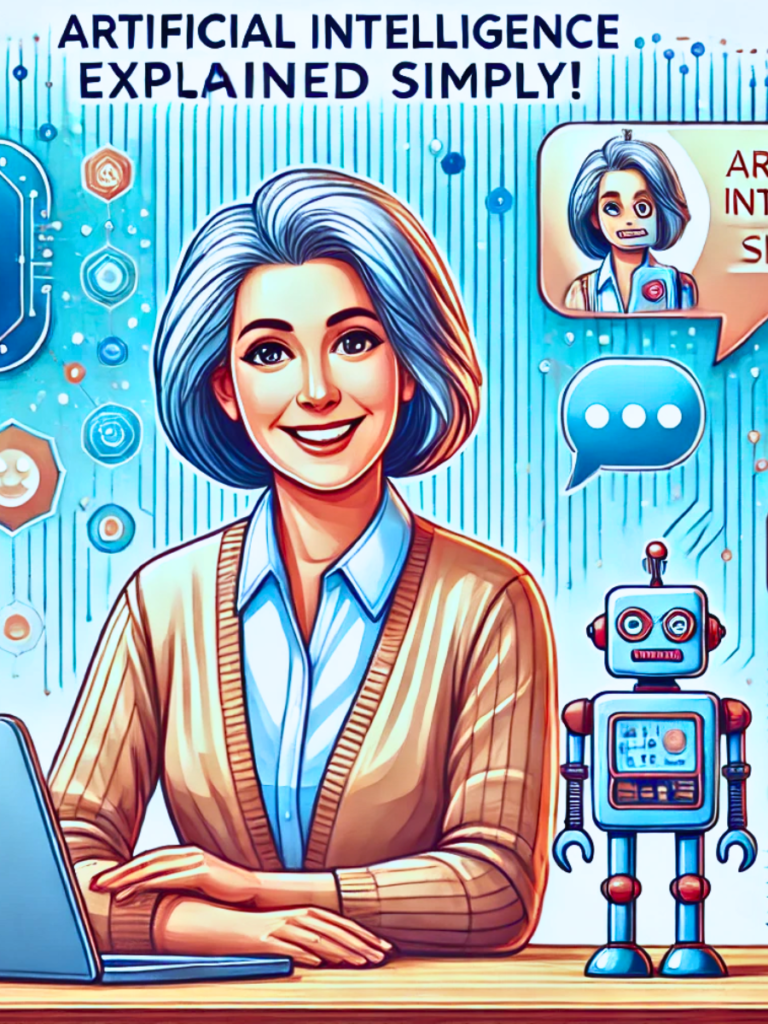
What is AI-Artificial Intelligence ?
Artificial intelligence (AI) is the virtualization of human intelligence by robots built to think, learn, and adapt. It includes machine learning, natural language processing, robotics, and other technologies.
AI’s Transformative Power:- How It Shapes Our Future
AI is no longer limited to science fiction. It has transformed industries by transforming how we work, live, and interact. This tutorial delves into the fundamental implications of AI, its practical applications, and its ability to form a better future.
Key Applications of AI across Professions
1. AI in Healthcare
AI-powered tools have altered healthcare by allowing for early detection, personalized therapy treatments, and robotic procedures. IBM Watson and other data-driven technologies assist doctors in making decisions based on facts.
2. AI in Education
AI-powered education systems such as Coursera and Duolingo provide individualized learning experiences. Virtual coaching enables students to overcome difficulties at their own speed.
3. AI in Transportation
Self-driving cars and AI-powered traffic control systems boost safety and efficiency. Companies such as Tesla are leading the way with self-driving cars.
4. AI in Business
Self-driving cars and AI-powered traffic control systems boost safety and efficiency. Companies such as Tesla are leading the way with self-driving cars.
5. AI in Entertainment
AI-powered platforms such as Netflix and Spotify curate personalized content to keep users engaged. AI is also utilized to create realistic video game characters and virtual environments.

The Benefits of Artificial Intelligence
1. Increased Efficiency
AI automates boring tasks, allowing humans to concentrate on more complicated problem solving and creative projects.
2. Improved Decision-Making
AI evaluating huge databases makes judgments more accurate and data-driven.
3. Enhanced Customer Experiences
Personalized suggestions and 24/7 chatbot support increase user happiness across several platforms.
Challenges and Ethical Concerns
1. Data Privacy
AI relies on massive volumes of data, raising questions about how personal information is collected and used.
2. Job Displacement
AI-powered automation may replace certain jobs, thereby causing unemployment in specific areas.
3. Bias and Fairness
AI systems may inherit errors from their training data, resulting in biased outcomes. Ethical artificial intelligence development is crucial.
The Future of AI: What Lies Ahead?
As AI advances, its applications in disciplines such as quantum computing, space exploration, and personalized treatment will expand. However, ensuring AI’s good impact will require striking a balance between innovation and ethical standards.
Conclusion
Artificial intelligence is a transformative force that is altering our world, not a passing trend. While the opportunities are numerous, tackling the problems properly will determine how humanity benefits from this breakthrough technology
FAQs
1. What is AI’s primary purpose?
AI seeks to improve efficiency and decision-making by imitating human intellect.
2. How does artificial intelligence (AI) affect daily life?
AI applications such as virtual assistants, personalized recommendations, and automation are making ordinary tasks easier.
3. Which industries benefit the most from AI?
Healthcare, education, business, and entertainment are among the many subjects experiencing significant AI-driven improvements.
4. Are there risks connected with AI?
Yes, problems include job displacement, data privacy difficulties, and ethical worries about AI discrimination.
5. How can companies effectively implement AI?
Businesses should focus on staff training, ethical AI practices, and identifying areas where AI may improve productivity.
6. What is AI ?
Artificial intelligence, or AI, is the simulation of human intellect in robots that think, learn, and make decisions in the same way people do.
7. What are the Different Types of AI?
AI is classified into three types according to its capabilities.
1. Narrow AI (Weak AI): Meant for narrow tasks such as virtual assistants or facial recognition.
2. General AI (Strong AI) is a theoretical AI capable of performing any intellectual work that a human can.
3. Super intelligent AI: A future scenario in which AI excels human intelligence in all aspects.
